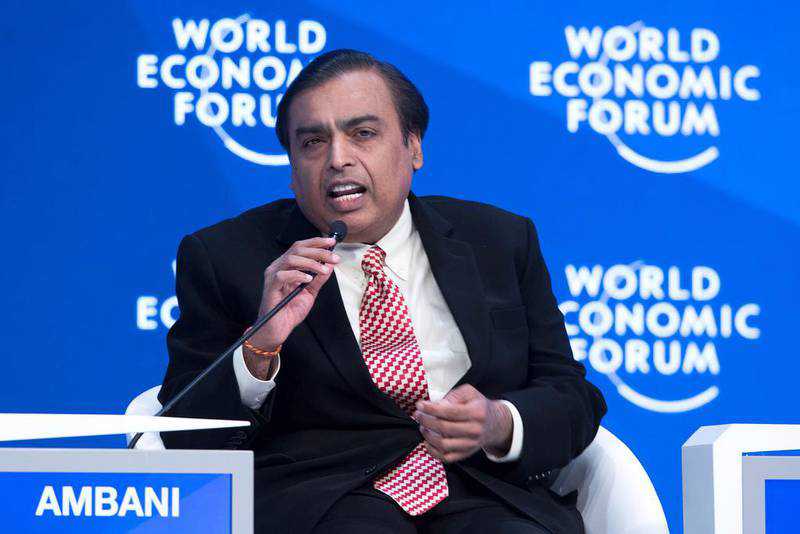Reliance and Saudi Aramco agree to re-evaluate $15bn oil-to-chemicals investment proposal

Reliance Industries, India’s largest private petrochemicals company controlled by billionaire Mukesh Ambani, and Saudi Aramco agreed to re-evaluate a previous non-binding agreement to sell a 20 per cent stake in the Indian company's oil-to-chemicals business as it shifts strategy to focus on renewable energy.
"Due to evolving nature of Reliance’s business portfolio, Reliance and Saudi Aramco have mutually determined that it would be beneficial for both parties to re-evaluate the proposed investment in O2C business in light of the changed context," Reliance said in a statement.
India’s largest private sector company said it had also withdrawn its application with the country's National Company Law Tribunal to segregate its O2C business. This was intended as part of the potential 20 per cent stake sale to Saudi Aramco.
At Reliance's annual general meeting in June, Mr Ambani unveiled an ambitious push into clean energy that earmarks 750 billion rupees ($10.1bn) of investment over three years to help transform the company, which still gets nearly 60 per cent of its revenue from fossil-fuel related businesses.
“The world is entering a new energy era, which is going to be highly disruptive,” said Mr Ambani, 64. “The age of fossil fuels, which powered economic growth globally for nearly three centuries, cannot continue much longer. The huge quantities of carbon it has emitted into the environment have endangered life on Earth."
"Our world has only one option, rapid transition to a new era of green, clean and renewable energy," Mr Ambani said.
“I envision a future when our country will be transformed from a large importer of fossil energy to a large exporter of clean solar energy solutions.”
Reliance has a 15-year strategy to become net-carbon zero by 2035.
Reliance and Aramco “over the past two years ... made significant efforts in the process of due diligence, despite Covid-19 restrictions”, Reliance said.
“The deep engagement over the past two years has given both Reliance and Saudi Aramco a greater understanding of each other, providing a platform for broader areas of cooperation. Saudi Aramco and Reliance are deeply committed to creating a win-win partnership and will make future disclosures as appropriate.”
RIL said it would continue to be Saudi Aramco’s preferred partner for investments in India’s private sector and will collaborate with Saudi Aramco and SABIC for investments in Saudi Arabia.
Reliance Industries and Saudi Aramco had signed a non-binding letter of intent in August 2019 for a potential 20 per cent stake acquisition by the world’s biggest crude exporter in the O2C business of Reliance for an enterprise value of $75 billion.
In July 2020, Mr Ambani said the transaction had been delayed “due to unforeseen circumstances in the energy market and the Covid-19 situation”. RIL also announced a plan to create a separate entity for the business in September 2020.
As recently as June this year, Reliance said it expected to finalise the investment deal with Aramco and appointed the Saudi Arabia company's chairman Yasir Al-Rumayyan as an independent director on its board.
Meanwhile, Reliance Industries announced it will develop one of the world’s largest integrated renewable energy manufacturing facilities in the western Indian state of Gujarat as it unveiled plans for new energy and materials businesses.
The Dhirubhai Ambani green energy giga complex at Jamnagar in Gujarat will comprise four giga factories to produce solar modules, green hydrogen, fuel cells and to build a battery grid to store electricity, according to Reliance's statement.
The value of the renewable energy manufacturing unit or when it would be ready for operations was not disclosed.
“Jamnagar, which accounts for a major part of the company’s oil to chemicals assets, is envisaged to be the centre for Reliance’s new businesses of renewable energy and new materials, supporting India’s net-zero commitment,” Reliance said.
India set a target of becoming carbon neutral by 2070, Prime Minister Narendra Modi told the Cop26 climate change summit in Glasgow. By 2030, the country will expand its clean energy sector, obtain half its power from renewable resources and cut carbon emissions by one billion tonnes, he said.
One of Reliance’s “giga factories” will manufacture solar modules, the second involves large-scale grid batteries to store electricity and the third will build and install electrolysers for separating green hydrogen from water. The fourth factory would be for fuel cells, which use oxygen from the air and hydrogen to generate electricity.
To pivot to green energy, Reliance Industries bought a German maker of photovoltaic solar wafers and signed a deal with a Danish company to manufacture hydrogen electrolysers in India.
India’s most valuable company raised more than $30bn selling stakes in its technology and retail units, and through a sale of shares to existing investors. Reliance brought on board Silicon Valley giants such as Google and Facebook to help grow its digital and e-commerce footprint in a $1 trillion retail market of more than 1.3 billion people.
Tags :
Previous Story
- Energy Transition, Inflation Drive Bullish Commodities Outlook
- Nutiva Unveils Vibrant New Branding; Reaffirming Purpose-Driven Leadership...
- New Lumin Edge Gives Homeowners Control and Optimization...
- Would the world be better if it was...
- ‘Too risky’ to not use both battery electric...
- Toshiba spins off energy, computer device units
- Fuel, housing costs boosted October’s inflation. Here’s what...
- Wholesale prices rose 8.6% year over year in...